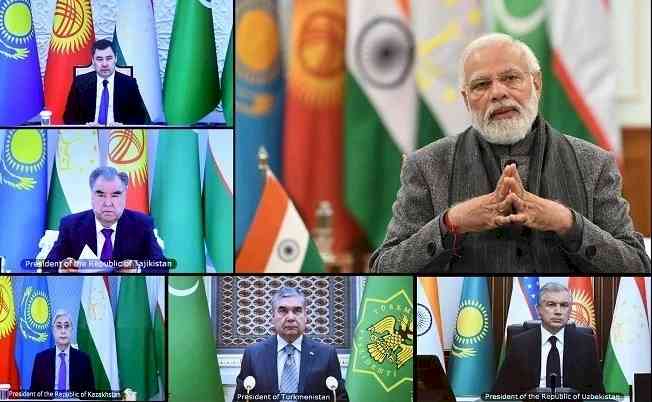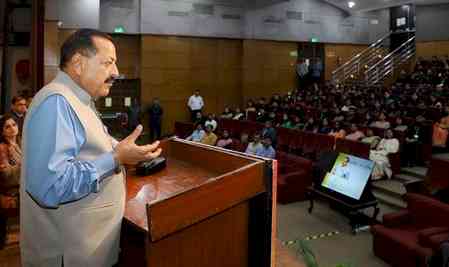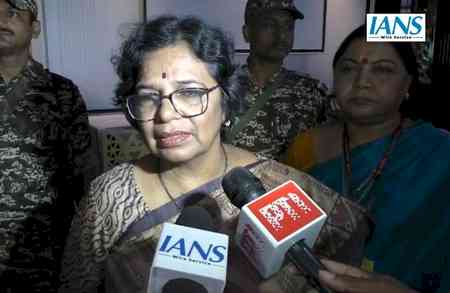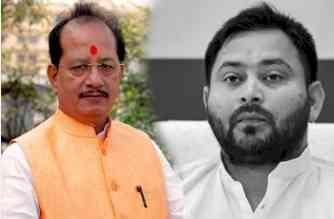PM Modi flags intent to elevate India-Central Asia ties to a new level during first regional summit
Prime Minister Narendra Modi on Thursday proposed elevating ties with Central Asia to an unprecedented new level, guided by an "ambitious vision" shared by India and the five post-Soviet Republics.

Atul Aneja
New Delhi, Jan 28: Prime Minister Narendra Modi on Thursday proposed elevating ties with Central Asia to an unprecedented new level, guided by an "ambitious vision" shared by India and the five post-Soviet Republics.
"Our cooperation has achieved many successes over the past three decades. And now, at this crucial juncture, let us define an ambitious vision for the coming years as well," PM Modi said in the first India-Central Asia summit held in a virtual format.
The Prime Minister stressed the region's security and prosperity can be guaranteed only if the India and Central Asian countries firmly bond. PM Modi wanted to "make it clear that mutual cooperation between India and Central Asia is essential for regional security and prosperity".
He pointed out that "Central Asia is central to India's vision of an integrated and stable extended neighbourhood". Central Asia and West Asia are the key pillars defining India's doctrine of engaging its "extended neighbourhood".
Second, the Prime Minister made it plain that the next phase of ties can be anchored only if the New Delhi-Central Asia relationship is firmly institutionalised at all levels drawing many layers of stakeholders. "The second objective is to give an effective structure to our cooperation. This will establish a framework of regular interactions at different levels and among various stakeholders.
The Prime Minister said that the third objective of the summit was "to create an ambitious roadmap for our cooperation."
Referring to the centrality of regional security, the Prime Minister, specially cited the common concern shared by India and Central Asia to defuse turbulence in Afghanistan. "We are all concerned about the developments in Afghanistan. In this context also our mutual cooperation has become more important for regional security and stability," PM Modi said.
Analysts point out that the Prime Minister's initiative to deepen structural linkages with Central Asia has at least four major objectives. First, the new initiative seeks to revive the natural historical and civilisational ties between India and the region in the digital age. Second, as India's engagement-from culture, economy, energy and military---deepens, it will serve an antidote to region's critical reliance on China, and the temptation to embrace Turkey, which is wooing these countries on account of their Turkic cultural roots. India shares this perception with Russia, whose President, Vladimir Putin was in New Delhi last month. Third, India sees secular Central Asian countries as bulwarks to reverse the tide of fundamentalism and extremism radiating from Afghanistan and Pakistan. Fourth, Central Asia is rich in natural resources-an element which can be fused in India's Atmanirbhar Bharat vision.
The Prime Minister spotlighted that India has deep relations with all of the Central Asian countries. He cited Kazakhstan, which had emerged unscathed of a serious bout of internal instability, as an important partner in India's energy security.
Looking ahead, the PM Modi said that the summit will also focus on trade, connectivity, development partnership, culture, and people-to-people ties. India is keen that the landlocked Central Asia sees the Iranian port of Chabahar as the natural gateway to the Indian Ocean, instead of over-relying on the Pakistani ports of Karachi and the Gwadar in the conduct of its seaborne international trade.
(The content is being carried under an arrangement with indianarrative.com)
--indianarrative


 IANS
IANS 










